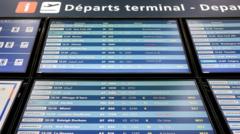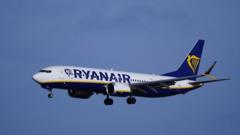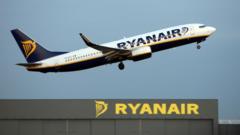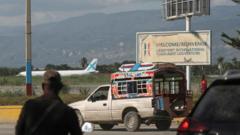Tens of thousands of passengers have been impacted by a strike involving French air traffic controllers, leading to the cancellation of more than 170 flights and disrupting the travel plans of over 30,000 individuals. The strike is rooted in disputes over working conditions involving two unions, prompting significant airline reactions and calls for systemic changes in response to such labor actions.
French Air Traffic Control Strike Disrupts Ryanair Flights for 30,000 Passengers

French Air Traffic Control Strike Disrupts Ryanair Flights for 30,000 Passengers
A French air traffic control strike leads to widespread flight cancellations across Europe, affecting thousands of travelers.
In a considerable disruption to travel plans, low-cost airline Ryanair announced it has been forced to cancel more than 170 flights due to a French air traffic control strike, which is scheduled to span Thursday and Friday. This labor action has resulted in far-reaching consequences for over 30,000 passengers, affecting not only routes directly to and from France but also flights operating over French airspace to other major destinations across Europe, including the UK, Ireland, Spain, and Greece.
The strike is organized by two French unions advocating for improved working conditions, citing issues such as staffing shortages and the introduction of a controversial clock-in system for air traffic controllers. French Transport Minister Philippe Tabarot criticized the unions' decision to strike at a pivotal time, labeling their demands as "unacceptable." He emphasized the adverse effects on holiday travelers.
Ryanair's chief executive, Michael O'Leary, condemned the strike as "holding European families to ransom" and urged European Commission President Ursula von der Leyen to take immediate measures to enforce minimum service levels during strikes, particularly in airspace services. The disruptions are expected to escalate further, with estimates suggesting a 40% reduction in flights from major Paris airports, including Charles de Gaulle and Orly.
Airlines for Europe (A4E), the premier aviation body on the continent, decried the strike as "intolerable" and warned that it poses significant challenges for holiday travelers during peak vacation season. EasyJet, another low-cost airline also affected by this disruption, expressed its disappointment and called for a resolution.
Ryanair mentioned its recent operation in the context of broader disruptions, referencing additional cancellations prompted by ongoing conflicts, including those in the Middle East. Despite the challenging situation, the airline noted it managed to operate over 109,000 flights in June, indicating that less than 1% of its overall flights were notably impacted by the strike.
This ongoing situation illustrates the challenges facing both airlines and travelers in the context of labor disputes and highlights the need for a collaborative approach to ensure the continued functioning of essential air travel services.
The strike is organized by two French unions advocating for improved working conditions, citing issues such as staffing shortages and the introduction of a controversial clock-in system for air traffic controllers. French Transport Minister Philippe Tabarot criticized the unions' decision to strike at a pivotal time, labeling their demands as "unacceptable." He emphasized the adverse effects on holiday travelers.
Ryanair's chief executive, Michael O'Leary, condemned the strike as "holding European families to ransom" and urged European Commission President Ursula von der Leyen to take immediate measures to enforce minimum service levels during strikes, particularly in airspace services. The disruptions are expected to escalate further, with estimates suggesting a 40% reduction in flights from major Paris airports, including Charles de Gaulle and Orly.
Airlines for Europe (A4E), the premier aviation body on the continent, decried the strike as "intolerable" and warned that it poses significant challenges for holiday travelers during peak vacation season. EasyJet, another low-cost airline also affected by this disruption, expressed its disappointment and called for a resolution.
Ryanair mentioned its recent operation in the context of broader disruptions, referencing additional cancellations prompted by ongoing conflicts, including those in the Middle East. Despite the challenging situation, the airline noted it managed to operate over 109,000 flights in June, indicating that less than 1% of its overall flights were notably impacted by the strike.
This ongoing situation illustrates the challenges facing both airlines and travelers in the context of labor disputes and highlights the need for a collaborative approach to ensure the continued functioning of essential air travel services.






















